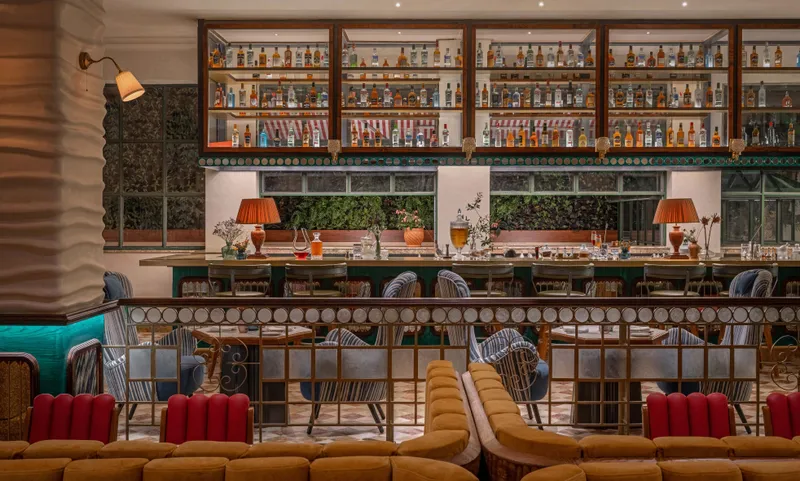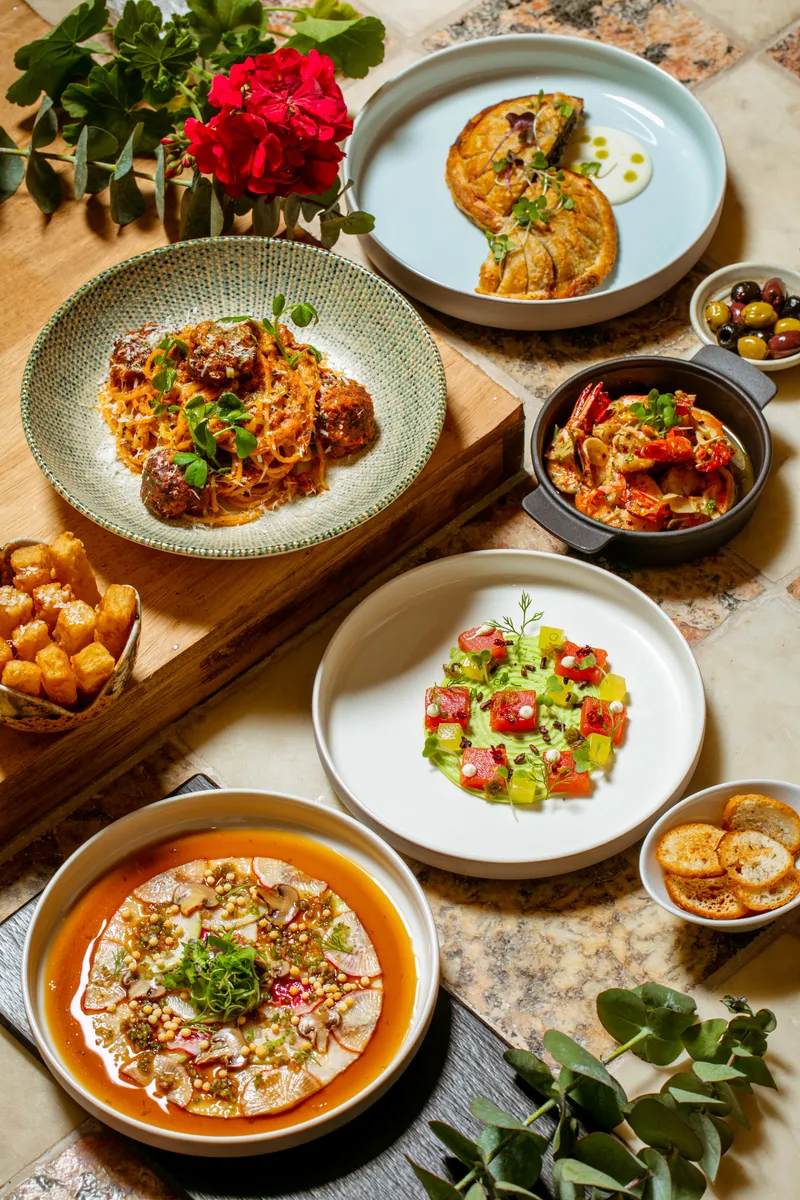Chef-entrepreneur Manu Chandra: The culinary maverick with an untameable spirit
YS Life caught up with Chef Manu Chandra, Founder Partner at Manu Chandra Ventures Private Limited, to know about his new restaurant, the magnificent LUPA, and what makes him the celebrated chef he is.
Chef Manu Chandra is no stranger to fame. For anyone who has remotely followed the growth trajectory of India’s food and beverage scene knows his contribution to its evolution. A pioneer in the true sense, he has brought several firsts to the country–from opening the first gastropub, introducing the open faced bao and trendy Asian dining and its many interpretations, revival of India’s romance with gin, and more.
In 2004, Chef Chandra joined the relatively young Olive Group as their youngest-ever head chef to open their Bengaluru outpost, Olive Beach. During his 17-year stint with the Olive Group of restaurants that ended in September 2021, he rose the ranks and became Chef-Partner. He has been instrumental in creating successful award-winning restaurant brands like Toast & Tonic, Monkey Bar, The Fatty Bao, Olive Beach, and Cantan.
The world was aghast when he announced his departure from the Olive Group. But in his true style, he recouped and announced Manu Chandra Ventures Private Limited, a Bengaluru-based hospitality company in partnership with his long-time colleague and hospitality professional, Chetan Rampal.
Several verticals fall under Manu Chandra Ventures Private Limited—Single Thread Catering (a bespoke and experiential catering solutions company), Savaa Ser (the restaurant arm), Holy Duck (a new-age creative studio that offers immersive branding, design, strategy, digital, video and content production), and Duality Concepts (a management and consulting company).

Chef Manu Chandra's Lupa restaurant in Bengaluru
LUPA, the first standalone restaurant under Savaa Ser, is an ambitious and audacious project in Chef Chandra’s words. Set in the heart of Bengaluru’s iconic MG road, the concept fuses classic European flavours with contemporary flair. It is named after the mythological La Lupa, Italian for ‘the she-wolf’.
“I think the pressure during this time was not to get back into business. I feel once you pause and restart, the expectations are exponentially greater than they were even when you were riding high. I knew if I faltered, the reaction would be fairly ruthless,” he confesses.
Chef Chandra has always received acclaim for introducing concepts that favour intermingling of cultures. Having been brought up in a multicultural family where food was the centrepiece, it comes naturally to him. His paternal grandparents were from Lucknow; his maternal grandmother hailed from Punjab, while his grandfather belonged to Tamil Nadu.
“My grandparents would dote on their grandchildren and always feed us. They made sure we were exposed to their food and culture, be it during festivals or otherwise. That’s not all—we always had visitors at home who would come over and stay for weeks. There were singers, actors, poets, artists, and actors—each one bringing their culture to our home,” he recalls.

Chef Manu Chandra at work
India is the future for food, says celebrated French culinary expert Alexandre Kerbouz
Speaking about his childhood eating habits, he paused for a moment to highlight how seasonality played a huge role in his household. Certain foods would appear at the dinner table with a change in season. Everything that is a moniker today–from a focus on local and seasonal produce to zero waste was already being followed two decades ago.
“We stepped out to shop for fresh produce every day. The preparation was always painstaking. In fact, sometimes we would plan it months in advance,” he says. “My grandmother would painstakingly make vadiyaan, dry them out on the terrace and store them for the winter season. Whether it was kanji or pickles, everything was broken down,” he adds.
While he always loved cooking and eating, he didn’t think of taking it up as a profession until school ended. At that point, he got through all the top hotel management schools in the country, but as destiny would have it, he went on to pursue history at St. Stephen’s College, Delhi University.
“It’s quite hilarious because apart from the hotel management schools, I had only applied to St. Stephen’s. I was sure I wouldn’t get through. During my interview with the panel, there was a passionate discussion on food history. That’s probably how I made it,” he mentions.
In the first year of college, he wrote, designed, and helped photograph a book on fusion cuisine along with friends Ishaan Tankha and Priyanka Dasgupta, while also apprenticing at the famous Dum Pukht and working part-time at Café Turtle, when Khan market was a sleepy little market.
There was another trigger point for Chef Chandra, when he came across an Alice in Wonderland three or four-tiered theme cake while browsing a magazine. It had a rabbit sitting on top holding a teapot that was spilling tea onto a cup. He just couldn’t believe someone could create something so complex!
Shortly after, he applied to the Culinary Institute of America (CIA), Hyde Park, New York. During his time there, he was fortunate to have apprenticed with some of the City's most celebrated kitchens at the time, and also opened the famed Mandarin Oriental Hotel in Manhattan. Later, he travelled to Norway to work with the Michelin-starred Chef Eyvind Hellstrom at Bagatelle, well before Nordic cuisine was even acknowledged globally.
“Whilst I am a chef-entrepreneur, I have always maintained I have an advantage because I am able to take all these past experiences and encapsulate them into a comprehensive and cohesive personality, which is far more likeable. There's an inherent ability in me to connect across divides,” he shares.

Food at Lupa restaurant
With LUPA having made the right noise, Chef Chandra seems to have given Bengaluru a space to boast about. He admits opening a new restaurant is no easy task. In fact, when they were starting out, he was aware they’d have a choppy start.
“In the first two to three weeks, certain things went right while others didn’t. For most new places, it’s forgiven. In my case, it’s very difficult. Fortunately, a few months down the road, we have found our rhythm and are doing phenomenally well. The endeavour was always to be a better version of myself. I was never trying to break new ground but it probably happened by accident,” he shares.
The world may be abuzz with innovation in food, but Chef Chandra believes there isn’t much happening today. He thinks it is time to build on that foundation, which is why he has his eyes set on other ventures that are a testament to his faith.
He is involved with The Social Kitchen, an initiative that aims to bring families back to the kitchen or table to interact and talk using new kitchen design as a former brand ambassador of the German brand Nolte.
He is also the founding curator and was on the advisory board for the Serendipity Arts Festival; India's largest, inclusive arts fest, which had culinary arts as a discipline for the first time.
Besides his own companies, Chef Chandra is also an investor and partner in Chota Hazari Spirits, a company focused on small-batch spirits and a plant protein company with a meat-alternate line, Shaka Harry. He is also Founder-Partner of Bengaluru-based urban artisanal cheese brand, Begum Victoria.
What really is the secret sauce behind being a successful chef-entrepreneur?
“Definitely no work-life balance. You sacrifice and feel bad about it, but usually it’s too late. Most success stories are based on a sense of loss and regret. But I must admit my appetite for risk is high. I don’t hold back from offering elevated experiences,” he concludes.
Edited by Megha Reddy







